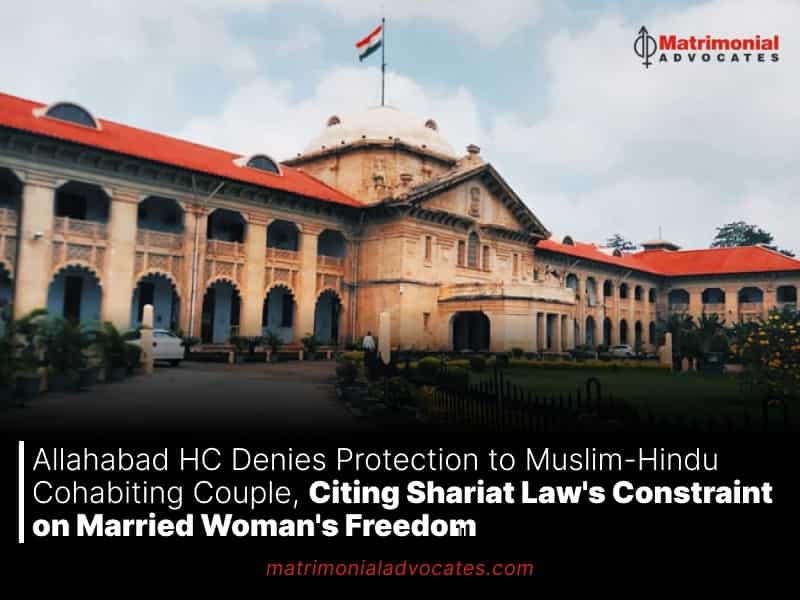
The Allahabad High Court, in its adjudication of a petition filed by a Muslim woman and Hindu man cohabiting in a live-in relationship, articulated that the legal status of marriage imposes constraints upon the actions of a wedded wife. The Court thereby declined to grant protection to the petitioners against potential threats from the woman’s family and relatives.
A Single Bench of Justice Renu Agarwal observed, “From the factual matrix of the case it is apparent that petitioner no.1 is legally wedded wife petitioner no.2. She has not obtained any decree of divorce from the competent authority. She is living with petitioner no.2 in contravention of the provisions of Muslim Law(Shariat), wherein legally wedded wife can not go out side marriage and this act of Muslim women is defined as Zina and Haram. If we go to the criminality of the act of petitioner no.1 she may be prosecuted for the offence under section 494 and 495 IPC, as such relationship is not covered within the phrase of live-in-relationship or relationship in the nature of marriage.”
Advocate Fareed Ahmad served as legal representative for the petitioners, while Additional Chief Standing Counsel Ashwani Kumar Tripathi acted on behalf of the respondents.
Case Overview:
The petition was lodged with the objective of procuring a writ order or directive in the nature of mandamus, compelling the respondents (the family and relatives) to abstain from intruding upon the tranquility of the petitioners, a cohabiting couple, and to desist from any form of harassment directed towards them. Furthermore, the petitioners sought judicial intervention to secure the couple’s safety by means of a writ order or directive. The Muslim woman, aged 44, and the Hindu man, aged over 36, are parties to the case. It is pertinent to note that the woman had previously entered into matrimony with a Muslim individual who subsequently contracted a second marriage with another Muslim woman.
Subsequent to her volitional departure from her matrimonial domicile, the woman elected to reside at her parental residence, purportedly due to maltreatment by her father. Consequently, she opted to cohabit with petitioner no. 2, the Hindu man, in a live-in arrangement. Despite their concerted efforts, the couple encountered persistent interference from the woman’s parental guardians, instigating apprehensions regarding their personal safety and liberty vis-à-vis potential threats emanating from familial quarters. In an endeavor to mitigate these concerns, the couple petitioned the Senior Superintendent of Police for protective measures. Regrettably, the authorities failed to act upon their entreaty, thereby exacerbating the precariousness of their situation.
In the aforementioned case, the High Court observed, “… the learned Standing Counsel contended that petitioner no. 1 is currently wedded to one Mohsin, without having obtained a divorce decree from her previous spouse, and subsequently cohabiting with petitioner no. 2 constitutes an act of adultery, thereby precluding legal protection of their relationship. The learned Standing Counsel invoked precedents such as the Supreme Court’s ruling in Kiran Rawat and Another Vs. State of U.P. and a Division Bench judgment of this Court in the matter of Asha Devi and Another Vs. State of U.P. and 3 Others, as the basis for opposing the petition.”
“In the present case petitioner no.1 is Muslim by religion and she has not moved any application to the authority concerned for conversion of her religion under sections 8 and 9 of the Conversion Act. Hence petitioner no.1 is living in relationship with petitioner no.2 without obtaining divorce from her husband, that constitute an offence under sections 494 and 495 IPC and also without complying the provisions of sections 8 & 9 of the Conversion Act. Hence such type of criminal act cannot be supported and protected by the Court”, it held.





